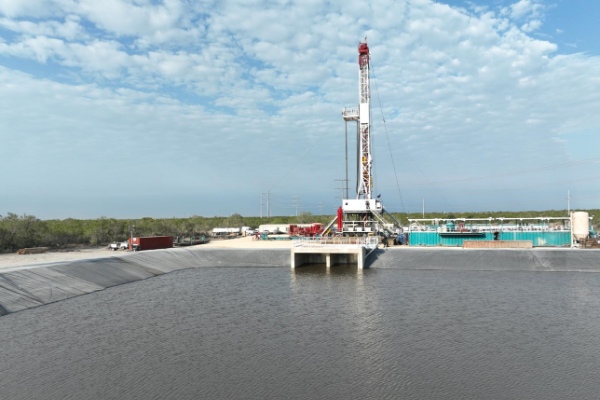Geothermal Startup Sage Geosystems Highlights Potential for New Energy in Houston
Published Nov 12, 2024 by Shaw Adcock
Long known as the energy capital of the world, Houston is proving its merit as the industry embraces an all-inclusive approach to energy sources. Beyond the wealth of oil and gas capital, Houston has become a landing spot for numerous solar, wind and battery storage investments. Companies like Fluence Energy, Renewable Parts and Solar Plus have chosen Houston for its manufacturing of innovative energy products.
Geothermal Energy: An Untapped Resource
Geothermal energy, often unsung in the new energy landscape, can be found beneath our feet, harnessing the power of heat lying underground. In conventional geothermal power plants, wells are drilled into geothermal reservoirs to access hot water or steam, which is then brought to the surface. This steam is used to drive turbines that generate electricity. Sage Geosystems is changing that by pursuing geothermal potential in rock that is hot but doesn't have the large volumes of water to bring the heat to the surface. Hot, dry rock enables geothermal power generation in many more places as the geology is more prevalent which enables geothermal to now be deployable almost anywhere in the world.
Sage Geosystems: Leading Geothermal Innovation
Houston is seeing its chance to make a mark with geothermal thanks to companies like Sage Geosystems, founded in 2020 with its headquarters near Bush Intercontinental Airport. Sage works to build the technology that makes this renewable energy a greater force in the worldwide energy transition, engaged in contracts and partnerships with local energy providers, major government agencies like the U.S. Department of Defense (DOD) and hyper-scalers like Meta Platforms.
On the public utility side, the company recently partnered with the San Miguel Electric Cooperative to build the first geopressured geothermal system. The technology used can be paired with solar and/or wind to convert these intermittent clean energy sources to 24-hour power generation, or it can be used to move these clean energy sources from a time of day when the demand is low to a time of day when the demand is high, stabilizing the utility grid and helping mitigate the issue of blackouts and brownouts. The facility will be commissioned in December.
Sage has three ongoing projects with the DOD. The U.S. Air Force recently provided Sage with $1.9 million in Tactical Funding Increase (TACFI) funding to perform a geothermal demonstration with electricity generation, which will take place in Sage's test well in Starr County, Texas with a targeted completion date of Q3/Q4 2025. The Defense Innovation Unit (DIU) has funded two geothermal feasibility studies for the U.S. Army installation of Fort Bliss in El Paso and the Naval Air Station CC in Corpus Christi. Sage is performing these feasibility studies with the University of Texas Bureau of Economic Geology. The intent of these studies is to evaluate the technical and economic feasibility of geothermal system installations using Sage's Geopressured Geothermal System (GGS) technology at these two DOD installations.
Collaboration Powers Innovation in Houston
As evidenced by the above, collaboration plays a central role in the growth of Sage Geosystems. The company has not only partnered with utility companies and major governmental institutions, but also collaborated with the Rice Alliance for Technology and the Greater Houston Partnership to facilitate work with institutions of higher learning like the University of Houston and Rice, venture capital firms, and established energy corporations such as ABB, Chesapeake (now Expand Energy), Nabors, and Geolog.
This sense of collaboration is one of the many reasons Sage Geosystems has thrived in Houston, along with the infrastructure, talent and innovative spirit that propels local companies to success.
The Houston Advantage for Energy Startups
“While Texas is the top energy state in the U.S., Houston is the heart. Houston provides not only access to the O&G industry, but also many utilities and others interested and/or working in energy...The Houston energy ecosystem and the benefits described above will continue to be critical in this scale-up plan." - Sage Geosystems CEO Cindy Taff
Looking ahead, Sage is building its first commercial energy storage facility and will be performing a geothermal power generation demonstration with the U.S. Air Force in 2025. Sage sees Houston as the best place to scale in Texas and throughout the world.
"Geothermal energy represents a transformative opportunity for Houston as it further strengthens our position as the global energy capital. Sage Geosystems' innovative approach to harnessing geothermal resources exemplifies the spirit of collaboration, innovation, and commitment to sustainability that defines our region’s energy leadership.” - Partnership Senior Vice President of Economic Development Craig Rhodes
For any new energy startups looking to establish themselves, Taff recommends leveraging Houston’s many assets for future success.
“Tap into existing knowledge that can be transferred to clean tech and partner with companies that know where to find the skills needed to give your startup a leg up,” Taff said. “Join local incubators like Rice Alliance for Technology and the Houston Technology Center and others, leverage Greater Houston Partnership and Greentown Labs for networking, collaborate with Rice University and University of Houston, and take advantage of Texas' business-friendly regulatory environment.”
Sage Geosystems is a prime example of how energy startups use Houston’s assets as a springboard to meet their potential, along with renowned innovators such as Syzygy Plasmonics, Cemvita Factory, and Fervo Energy.
Learn more about the business opportunities within Houston's energy industry and its all-inclusive energy ecosystem.
 The Houston Report
The Houston Report



















